Enhancing Nursing Care: Family Strengths Conversations Report
VerifiedAdded on 2022/09/28
|5
|1230
|33
Report
AI Summary
This report examines the crucial role of family strengths conversations in enhancing nursing care, particularly within the Australian healthcare context. It emphasizes the shift towards patient-centered and family-centered care, highlighting the positive outcomes associated with family involvement. The report focuses on the Strength-based nursing (SBN) framework, emphasizing its ability to maximize healthcare benefits and empower families. A key component is the Australian Family Strengths Nursing Assessment (AFSNA), which helps nurses identify family strengths and limitations through conversations, fostering therapeutic environments where families can share concerns and values. The report details how AFSNA, unlike traditional methods, focuses on family competencies to improve health outcomes, enhancing partnerships and relationships. The bidirectional nature of AFSNA and SBN care is highlighted, showing how clinicians can identify family concerns, guide conversations, and ultimately improve the quality of life for patients. The conclusion underscores the importance of AFSNA and strength-based nursing in initiating conversations, delivering holistic care, and empowering families in managing health challenges. The report references several studies supporting the efficacy of these approaches in clinical practice.
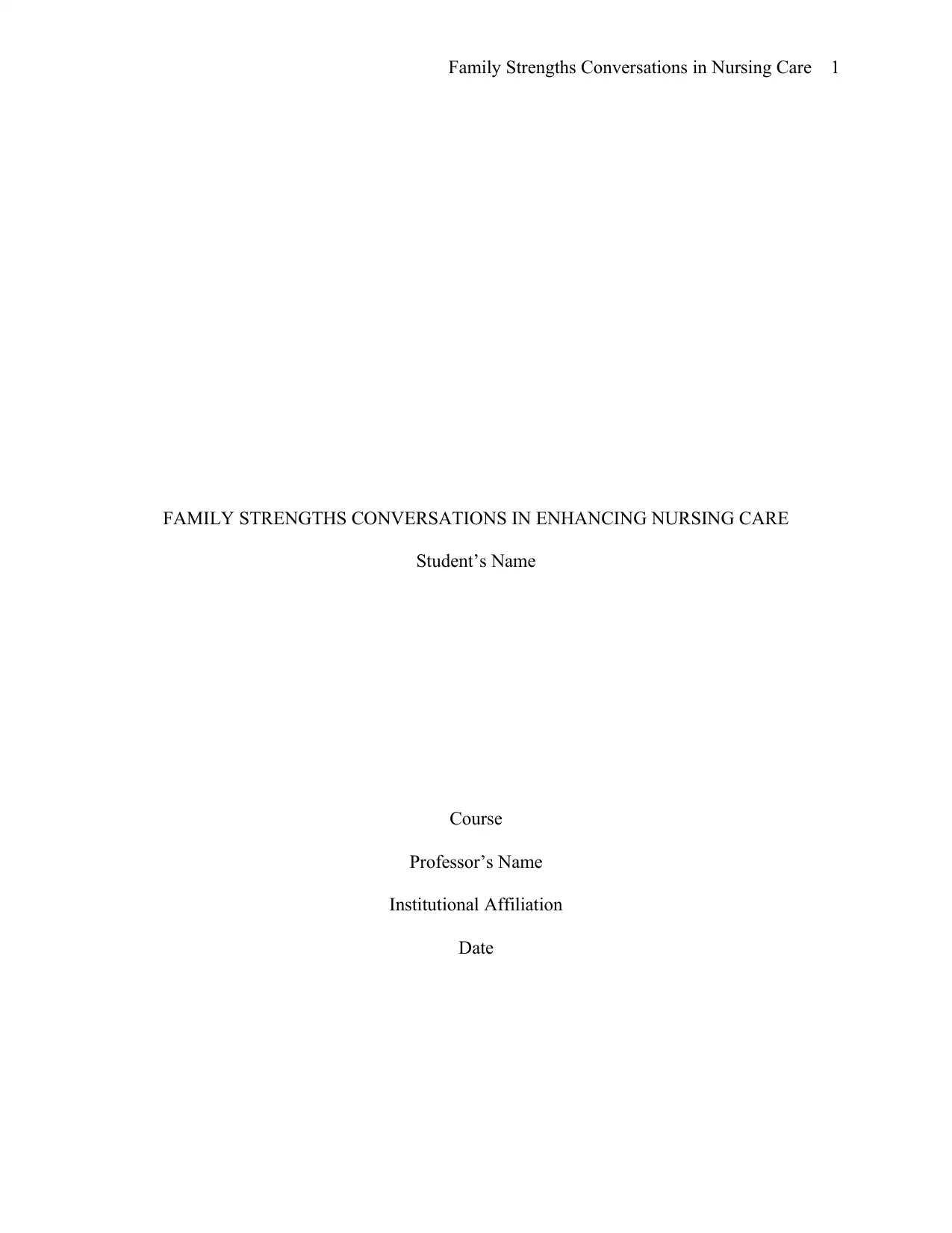
Family Strengths Conversations in Nursing Care 1
FAMILY STRENGTHS CONVERSATIONS IN ENHANCING NURSING CARE
Student’s Name
Course
Professor’s Name
Institutional Affiliation
Date
FAMILY STRENGTHS CONVERSATIONS IN ENHANCING NURSING CARE
Student’s Name
Course
Professor’s Name
Institutional Affiliation
Date
Paraphrase This Document
Need a fresh take? Get an instant paraphrase of this document with our AI Paraphraser
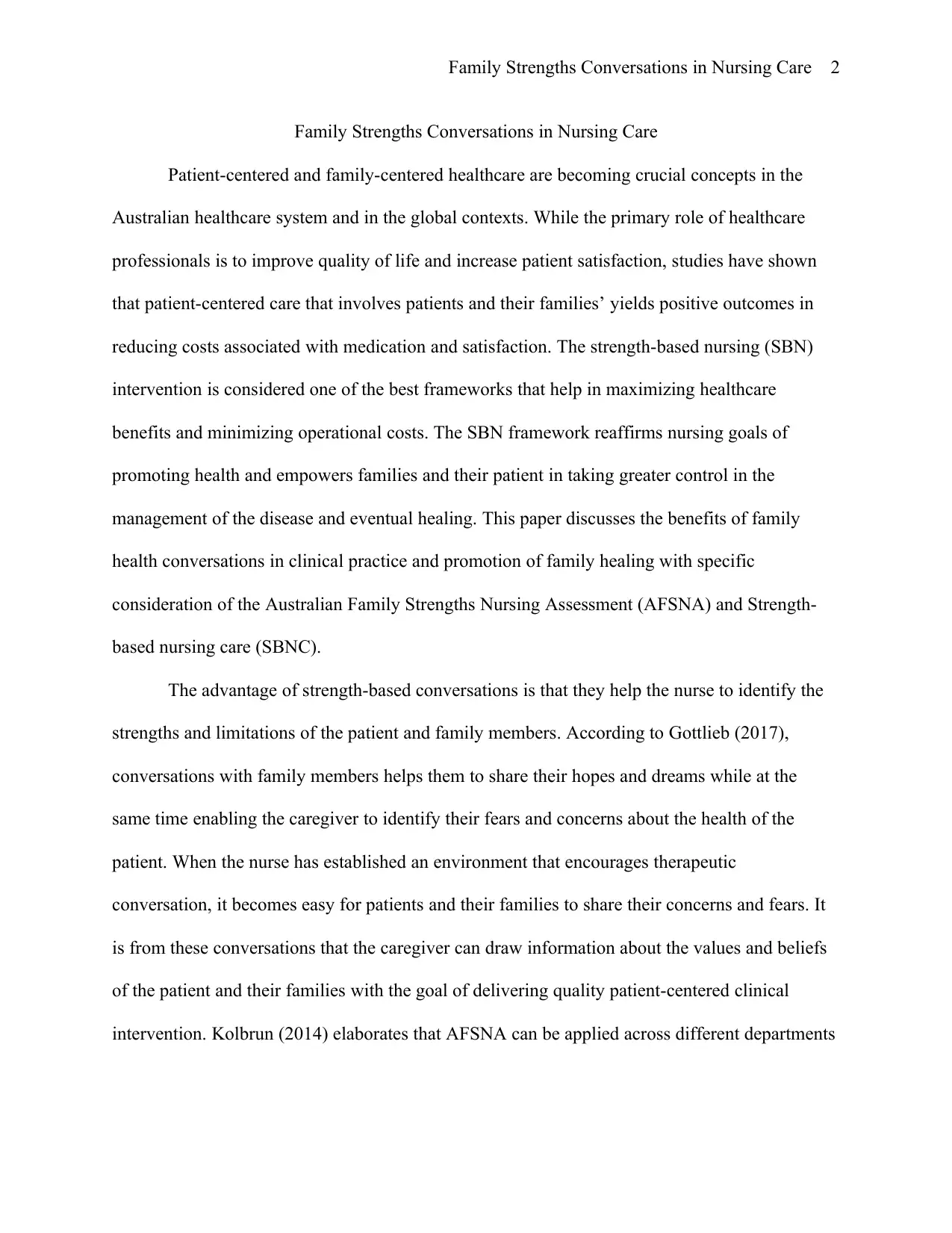
Family Strengths Conversations in Nursing Care 2
Family Strengths Conversations in Nursing Care
Patient-centered and family-centered healthcare are becoming crucial concepts in the
Australian healthcare system and in the global contexts. While the primary role of healthcare
professionals is to improve quality of life and increase patient satisfaction, studies have shown
that patient-centered care that involves patients and their families’ yields positive outcomes in
reducing costs associated with medication and satisfaction. The strength-based nursing (SBN)
intervention is considered one of the best frameworks that help in maximizing healthcare
benefits and minimizing operational costs. The SBN framework reaffirms nursing goals of
promoting health and empowers families and their patient in taking greater control in the
management of the disease and eventual healing. This paper discusses the benefits of family
health conversations in clinical practice and promotion of family healing with specific
consideration of the Australian Family Strengths Nursing Assessment (AFSNA) and Strength-
based nursing care (SBNC).
The advantage of strength-based conversations is that they help the nurse to identify the
strengths and limitations of the patient and family members. According to Gottlieb (2017),
conversations with family members helps them to share their hopes and dreams while at the
same time enabling the caregiver to identify their fears and concerns about the health of the
patient. When the nurse has established an environment that encourages therapeutic
conversation, it becomes easy for patients and their families to share their concerns and fears. It
is from these conversations that the caregiver can draw information about the values and beliefs
of the patient and their families with the goal of delivering quality patient-centered clinical
intervention. Kolbrun (2014) elaborates that AFSNA can be applied across different departments
Family Strengths Conversations in Nursing Care
Patient-centered and family-centered healthcare are becoming crucial concepts in the
Australian healthcare system and in the global contexts. While the primary role of healthcare
professionals is to improve quality of life and increase patient satisfaction, studies have shown
that patient-centered care that involves patients and their families’ yields positive outcomes in
reducing costs associated with medication and satisfaction. The strength-based nursing (SBN)
intervention is considered one of the best frameworks that help in maximizing healthcare
benefits and minimizing operational costs. The SBN framework reaffirms nursing goals of
promoting health and empowers families and their patient in taking greater control in the
management of the disease and eventual healing. This paper discusses the benefits of family
health conversations in clinical practice and promotion of family healing with specific
consideration of the Australian Family Strengths Nursing Assessment (AFSNA) and Strength-
based nursing care (SBNC).
The advantage of strength-based conversations is that they help the nurse to identify the
strengths and limitations of the patient and family members. According to Gottlieb (2017),
conversations with family members helps them to share their hopes and dreams while at the
same time enabling the caregiver to identify their fears and concerns about the health of the
patient. When the nurse has established an environment that encourages therapeutic
conversation, it becomes easy for patients and their families to share their concerns and fears. It
is from these conversations that the caregiver can draw information about the values and beliefs
of the patient and their families with the goal of delivering quality patient-centered clinical
intervention. Kolbrun (2014) elaborates that AFSNA can be applied across different departments
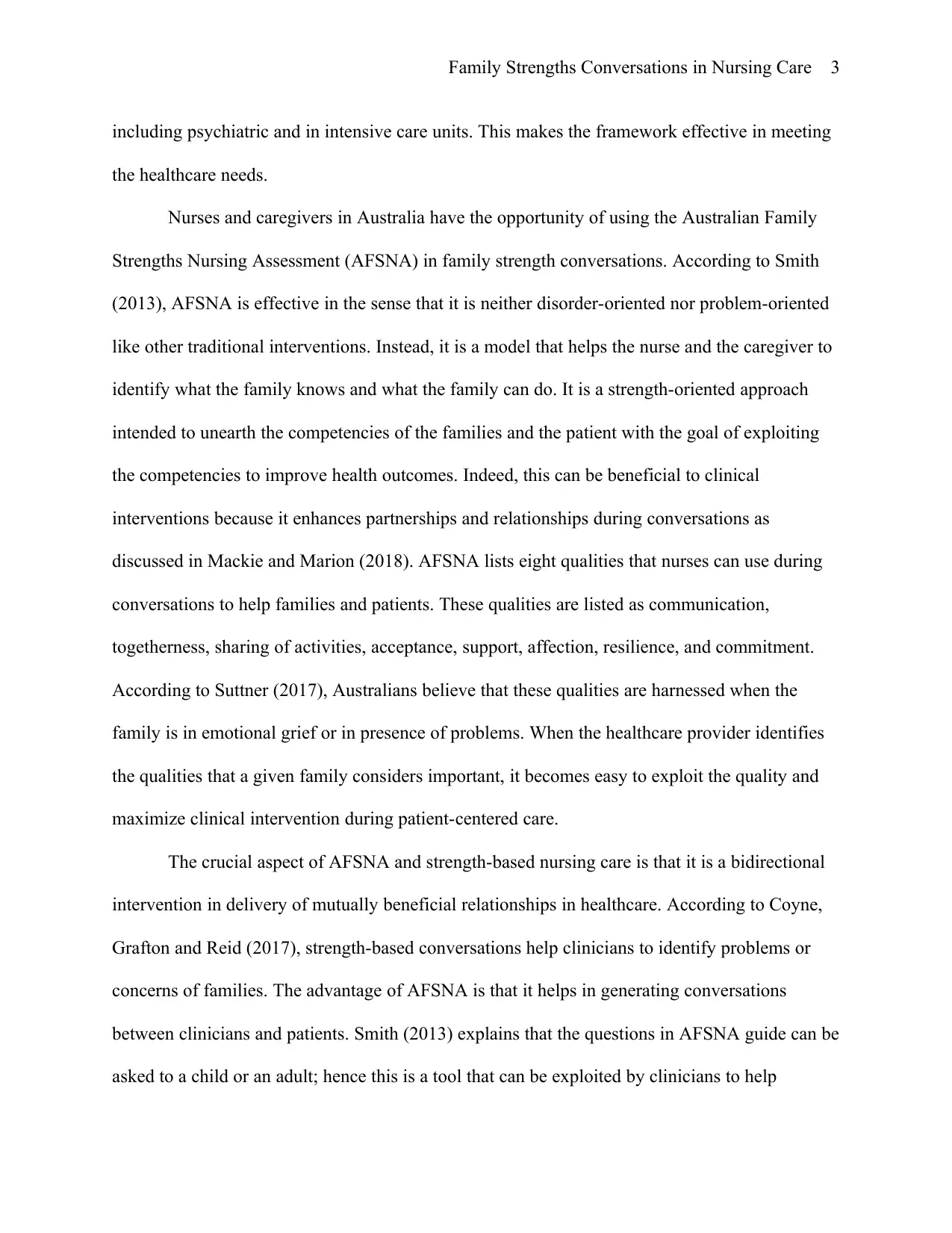
Family Strengths Conversations in Nursing Care 3
including psychiatric and in intensive care units. This makes the framework effective in meeting
the healthcare needs.
Nurses and caregivers in Australia have the opportunity of using the Australian Family
Strengths Nursing Assessment (AFSNA) in family strength conversations. According to Smith
(2013), AFSNA is effective in the sense that it is neither disorder-oriented nor problem-oriented
like other traditional interventions. Instead, it is a model that helps the nurse and the caregiver to
identify what the family knows and what the family can do. It is a strength-oriented approach
intended to unearth the competencies of the families and the patient with the goal of exploiting
the competencies to improve health outcomes. Indeed, this can be beneficial to clinical
interventions because it enhances partnerships and relationships during conversations as
discussed in Mackie and Marion (2018). AFSNA lists eight qualities that nurses can use during
conversations to help families and patients. These qualities are listed as communication,
togetherness, sharing of activities, acceptance, support, affection, resilience, and commitment.
According to Suttner (2017), Australians believe that these qualities are harnessed when the
family is in emotional grief or in presence of problems. When the healthcare provider identifies
the qualities that a given family considers important, it becomes easy to exploit the quality and
maximize clinical intervention during patient-centered care.
The crucial aspect of AFSNA and strength-based nursing care is that it is a bidirectional
intervention in delivery of mutually beneficial relationships in healthcare. According to Coyne,
Grafton and Reid (2017), strength-based conversations help clinicians to identify problems or
concerns of families. The advantage of AFSNA is that it helps in generating conversations
between clinicians and patients. Smith (2013) explains that the questions in AFSNA guide can be
asked to a child or an adult; hence this is a tool that can be exploited by clinicians to help
including psychiatric and in intensive care units. This makes the framework effective in meeting
the healthcare needs.
Nurses and caregivers in Australia have the opportunity of using the Australian Family
Strengths Nursing Assessment (AFSNA) in family strength conversations. According to Smith
(2013), AFSNA is effective in the sense that it is neither disorder-oriented nor problem-oriented
like other traditional interventions. Instead, it is a model that helps the nurse and the caregiver to
identify what the family knows and what the family can do. It is a strength-oriented approach
intended to unearth the competencies of the families and the patient with the goal of exploiting
the competencies to improve health outcomes. Indeed, this can be beneficial to clinical
interventions because it enhances partnerships and relationships during conversations as
discussed in Mackie and Marion (2018). AFSNA lists eight qualities that nurses can use during
conversations to help families and patients. These qualities are listed as communication,
togetherness, sharing of activities, acceptance, support, affection, resilience, and commitment.
According to Suttner (2017), Australians believe that these qualities are harnessed when the
family is in emotional grief or in presence of problems. When the healthcare provider identifies
the qualities that a given family considers important, it becomes easy to exploit the quality and
maximize clinical intervention during patient-centered care.
The crucial aspect of AFSNA and strength-based nursing care is that it is a bidirectional
intervention in delivery of mutually beneficial relationships in healthcare. According to Coyne,
Grafton and Reid (2017), strength-based conversations help clinicians to identify problems or
concerns of families. The advantage of AFSNA is that it helps in generating conversations
between clinicians and patients. Smith (2013) explains that the questions in AFSNA guide can be
asked to a child or an adult; hence this is a tool that can be exploited by clinicians to help
⊘ This is a preview!⊘
Do you want full access?
Subscribe today to unlock all pages.

Trusted by 1+ million students worldwide
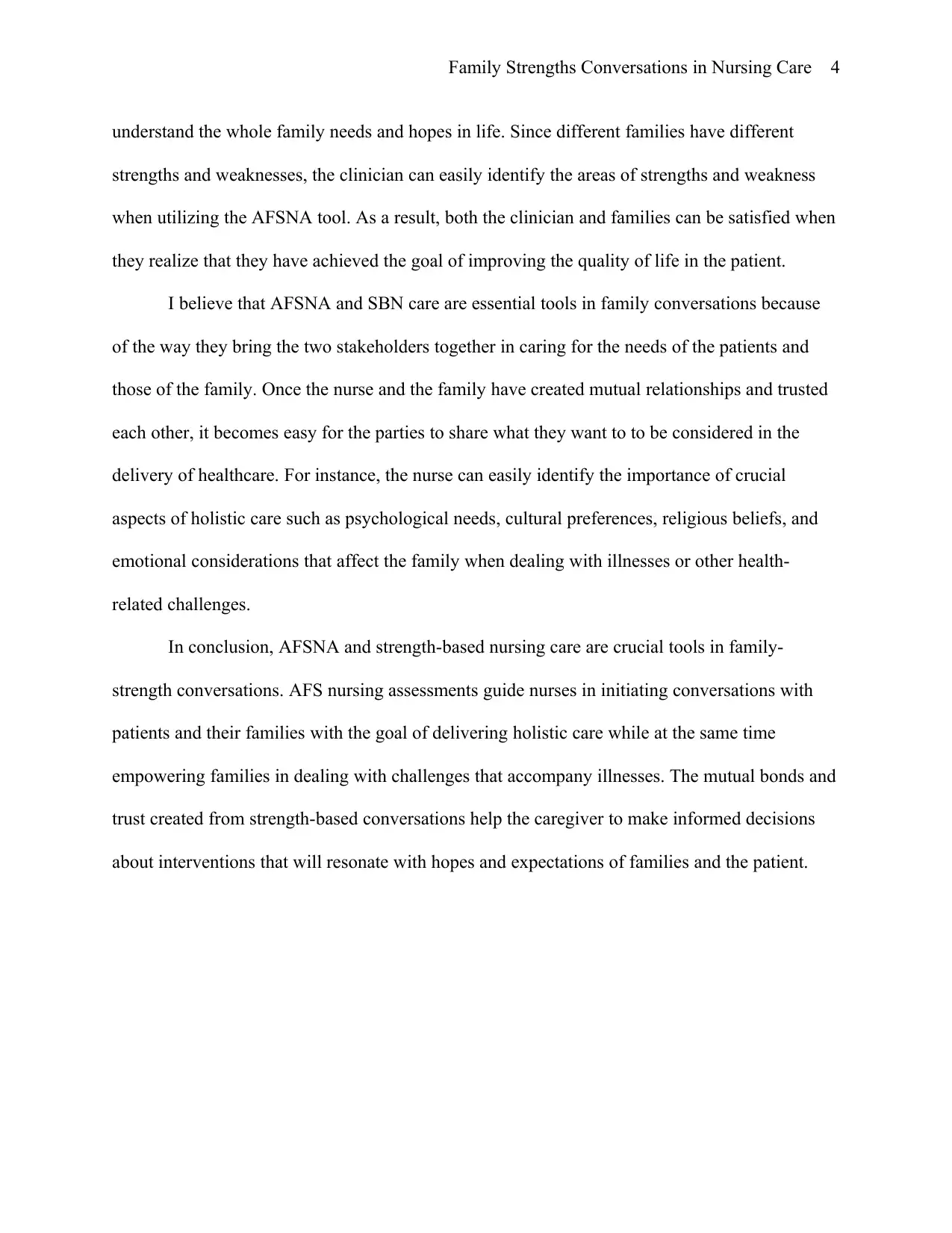
Family Strengths Conversations in Nursing Care 4
understand the whole family needs and hopes in life. Since different families have different
strengths and weaknesses, the clinician can easily identify the areas of strengths and weakness
when utilizing the AFSNA tool. As a result, both the clinician and families can be satisfied when
they realize that they have achieved the goal of improving the quality of life in the patient.
I believe that AFSNA and SBN care are essential tools in family conversations because
of the way they bring the two stakeholders together in caring for the needs of the patients and
those of the family. Once the nurse and the family have created mutual relationships and trusted
each other, it becomes easy for the parties to share what they want to to be considered in the
delivery of healthcare. For instance, the nurse can easily identify the importance of crucial
aspects of holistic care such as psychological needs, cultural preferences, religious beliefs, and
emotional considerations that affect the family when dealing with illnesses or other health-
related challenges.
In conclusion, AFSNA and strength-based nursing care are crucial tools in family-
strength conversations. AFS nursing assessments guide nurses in initiating conversations with
patients and their families with the goal of delivering holistic care while at the same time
empowering families in dealing with challenges that accompany illnesses. The mutual bonds and
trust created from strength-based conversations help the caregiver to make informed decisions
about interventions that will resonate with hopes and expectations of families and the patient.
understand the whole family needs and hopes in life. Since different families have different
strengths and weaknesses, the clinician can easily identify the areas of strengths and weakness
when utilizing the AFSNA tool. As a result, both the clinician and families can be satisfied when
they realize that they have achieved the goal of improving the quality of life in the patient.
I believe that AFSNA and SBN care are essential tools in family conversations because
of the way they bring the two stakeholders together in caring for the needs of the patients and
those of the family. Once the nurse and the family have created mutual relationships and trusted
each other, it becomes easy for the parties to share what they want to to be considered in the
delivery of healthcare. For instance, the nurse can easily identify the importance of crucial
aspects of holistic care such as psychological needs, cultural preferences, religious beliefs, and
emotional considerations that affect the family when dealing with illnesses or other health-
related challenges.
In conclusion, AFSNA and strength-based nursing care are crucial tools in family-
strength conversations. AFS nursing assessments guide nurses in initiating conversations with
patients and their families with the goal of delivering holistic care while at the same time
empowering families in dealing with challenges that accompany illnesses. The mutual bonds and
trust created from strength-based conversations help the caregiver to make informed decisions
about interventions that will resonate with hopes and expectations of families and the patient.
Paraphrase This Document
Need a fresh take? Get an instant paraphrase of this document with our AI Paraphraser
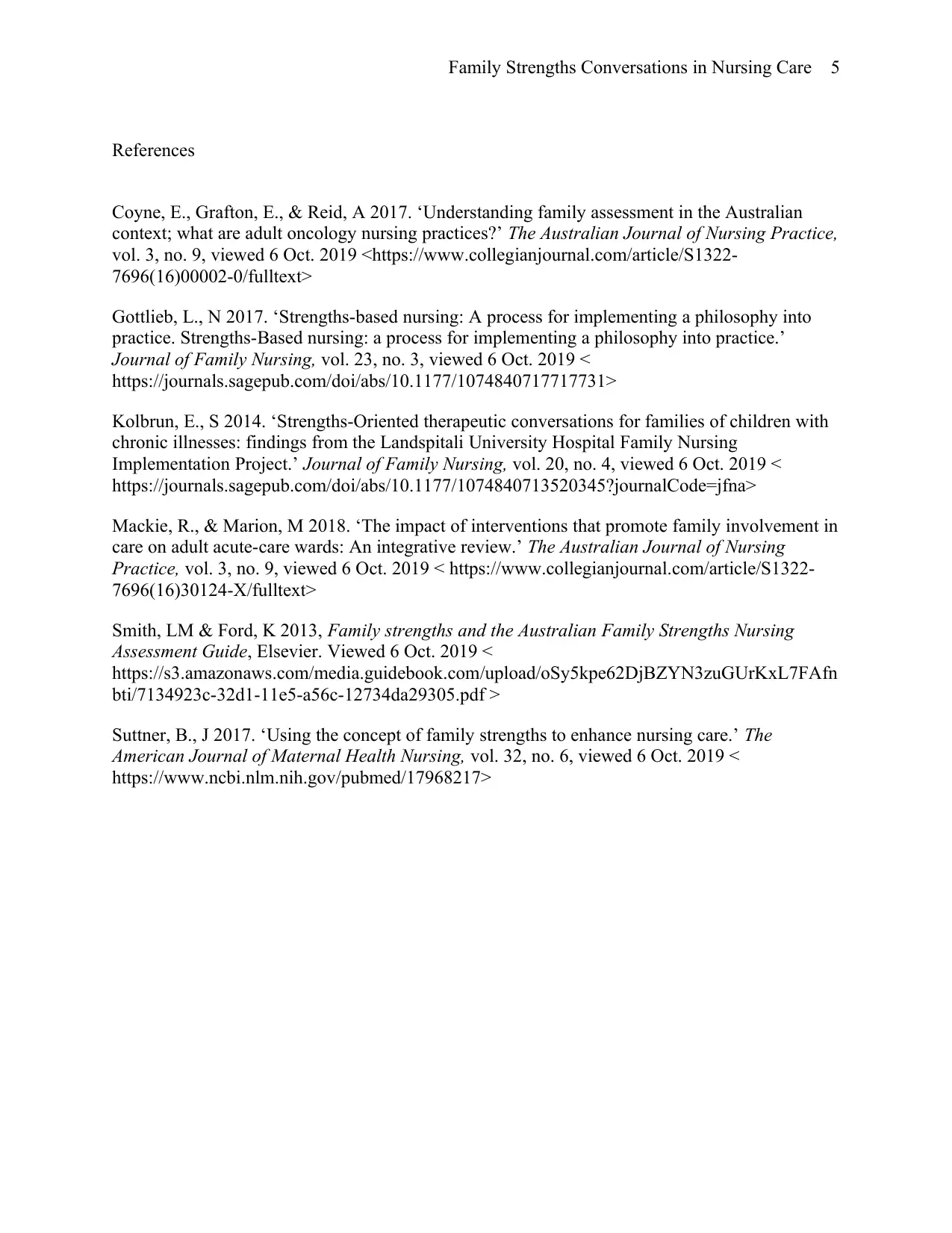
Family Strengths Conversations in Nursing Care 5
References
Coyne, E., Grafton, E., & Reid, A 2017. ‘Understanding family assessment in the Australian
context; what are adult oncology nursing practices?’ The Australian Journal of Nursing Practice,
vol. 3, no. 9, viewed 6 Oct. 2019 <https://www.collegianjournal.com/article/S1322-
7696(16)00002-0/fulltext>
Gottlieb, L., N 2017. ‘Strengths-based nursing: A process for implementing a philosophy into
practice. Strengths-Based nursing: a process for implementing a philosophy into practice.’
Journal of Family Nursing, vol. 23, no. 3, viewed 6 Oct. 2019 <
https://journals.sagepub.com/doi/abs/10.1177/1074840717717731>
Kolbrun, E., S 2014. ‘Strengths-Oriented therapeutic conversations for families of children with
chronic illnesses: findings from the Landspitali University Hospital Family Nursing
Implementation Project.’ Journal of Family Nursing, vol. 20, no. 4, viewed 6 Oct. 2019 <
https://journals.sagepub.com/doi/abs/10.1177/1074840713520345?journalCode=jfna>
Mackie, R., & Marion, M 2018. ‘The impact of interventions that promote family involvement in
care on adult acute-care wards: An integrative review.’ The Australian Journal of Nursing
Practice, vol. 3, no. 9, viewed 6 Oct. 2019 < https://www.collegianjournal.com/article/S1322-
7696(16)30124-X/fulltext>
Smith, LM & Ford, K 2013, Family strengths and the Australian Family Strengths Nursing
Assessment Guide, Elsevier. Viewed 6 Oct. 2019 <
https://s3.amazonaws.com/media.guidebook.com/upload/oSy5kpe62DjBZYN3zuGUrKxL7FAfn
bti/7134923c-32d1-11e5-a56c-12734da29305.pdf >
Suttner, B., J 2017. ‘Using the concept of family strengths to enhance nursing care.’ The
American Journal of Maternal Health Nursing, vol. 32, no. 6, viewed 6 Oct. 2019 <
https://www.ncbi.nlm.nih.gov/pubmed/17968217>
References
Coyne, E., Grafton, E., & Reid, A 2017. ‘Understanding family assessment in the Australian
context; what are adult oncology nursing practices?’ The Australian Journal of Nursing Practice,
vol. 3, no. 9, viewed 6 Oct. 2019 <https://www.collegianjournal.com/article/S1322-
7696(16)00002-0/fulltext>
Gottlieb, L., N 2017. ‘Strengths-based nursing: A process for implementing a philosophy into
practice. Strengths-Based nursing: a process for implementing a philosophy into practice.’
Journal of Family Nursing, vol. 23, no. 3, viewed 6 Oct. 2019 <
https://journals.sagepub.com/doi/abs/10.1177/1074840717717731>
Kolbrun, E., S 2014. ‘Strengths-Oriented therapeutic conversations for families of children with
chronic illnesses: findings from the Landspitali University Hospital Family Nursing
Implementation Project.’ Journal of Family Nursing, vol. 20, no. 4, viewed 6 Oct. 2019 <
https://journals.sagepub.com/doi/abs/10.1177/1074840713520345?journalCode=jfna>
Mackie, R., & Marion, M 2018. ‘The impact of interventions that promote family involvement in
care on adult acute-care wards: An integrative review.’ The Australian Journal of Nursing
Practice, vol. 3, no. 9, viewed 6 Oct. 2019 < https://www.collegianjournal.com/article/S1322-
7696(16)30124-X/fulltext>
Smith, LM & Ford, K 2013, Family strengths and the Australian Family Strengths Nursing
Assessment Guide, Elsevier. Viewed 6 Oct. 2019 <
https://s3.amazonaws.com/media.guidebook.com/upload/oSy5kpe62DjBZYN3zuGUrKxL7FAfn
bti/7134923c-32d1-11e5-a56c-12734da29305.pdf >
Suttner, B., J 2017. ‘Using the concept of family strengths to enhance nursing care.’ The
American Journal of Maternal Health Nursing, vol. 32, no. 6, viewed 6 Oct. 2019 <
https://www.ncbi.nlm.nih.gov/pubmed/17968217>
1 out of 5
Related Documents
Your All-in-One AI-Powered Toolkit for Academic Success.
+13062052269
info@desklib.com
Available 24*7 on WhatsApp / Email
![[object Object]](/_next/static/media/star-bottom.7253800d.svg)
Unlock your academic potential
Copyright © 2020–2026 A2Z Services. All Rights Reserved. Developed and managed by ZUCOL.





